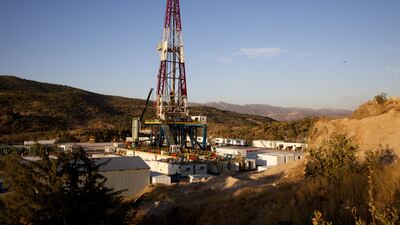Iraq’s Parliament on Tuesday held a session for the first reading of a set of amendments to the federal budget that will allow for the provision of compensation to the semi-autonomous Kurdish region for costs associated with producing and transporting crude, which could lead to the resumption of oil flow.
The move follows the Iraqi Cabinet's endorsement of the plan this month, amid efforts to resolve prolonged disputes over restarting oil exports from the region after a hiatus of more than 18 months.
The first reading of a bill or amendments marks the initial step to accepting them and starting the process. The second reading would initiate the debate and, if approved, the bill would then be eligible to go to a vote in the third reading.
The amendments under discussion authorise the federal government to reimburse the Kurdish Regional Government for expenses incurred in oil production and transportation. In exchange, the regional government is required to adhere to previous agreements that mandate oil sales through Iraq’s federal marketing body, known as Somo.
According to the plan announced by the Cabinet, an international technical consulting body will be commissioned in agreement with Kurdistan’s Natural Resources Ministry to calculate the “fair estimated costs for production and transportation for each field”. If an agreement is not reached on the consulting company within 60 days, Baghdad will choose one, the cabinet said.
It also issued a decision for the “immediate commencement” of oil delivery produced in the region to the State Oil Marketing Organisation, and the Federal Ministry of Finance will cover production and transport costs “as an advance” at a rate of $16 a barrel, to be reconciled retroactively after the completion of the assessment by the consulting company.
The decision is expected to ease tension that has plagued relations between Baghdad and Erbil since March 2023, when oil exports from the Kurdish region through Turkey were halted after an arbitration court ruled in favour of Baghdad, saying Ankara had breached a 1973 agreement when it allowed Kurds to pump without Baghdad's consent.
Since then, Baghdad and Kurdistan have failed to agree on various pending issues to resume exports, including the approval of the deals the Kurds signed unilaterally with oil companies and a system for payment for the developers.
After cabinet approval, the Association of the Petroleum Industry of Kurdistan (Apikur), which includes a number of companies operating in Kurdistan, welcomed the development and noted the suggested changes could address their long-standing requests.
Apikur member companies “believe that there could be sufficient scope in the current wording to cover our previous requests related to commercial terms and surety of payment for past and future exports via the Iraq-Turkey pipeline [ITP]”, a statement read.

However, Apikur said a written agreement is needed before oil exports are resumed.
“We remain ready to engage in productive discussions with Government of Iraq and Kurdistan Regional Government officials to clarify key details and finalise written agreements prior to resuming oil exports through the ITP,” it added.
Kurdistan's oil sector has been the lifeblood for its economy, accounting for 80 per cent of income. At the time when Turkey halted the exports, about 500,000 barrels of oil per day were sent to international markets. Of those, about 70,000 barrels came from Baghdad-run oilfields in the northern Iraqi province of Kirkuk.
Iraq, heavily reliant on oil revenue, faces a pressing need to address its budget deficit and boost its export capacity. Oil revenue makes up nearly 95 per cent of the federal budget.
In 2003, when the US led an international coalition to topple Saddam Hussein’s regime, oil and gas resources in the Kurdish region were not developed. Significant discoveries had been made but they were left untapped.
As Baghdad and Erbil failed to agree on a federal law to govern the oil and gas sector, the Kurdish authorities signed dozens of deals with foreign companies and countries.


